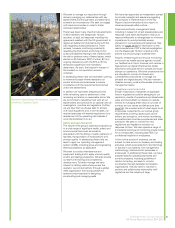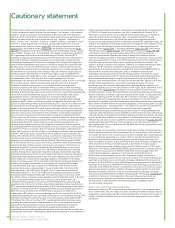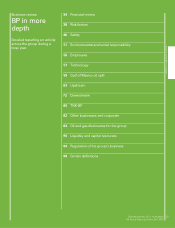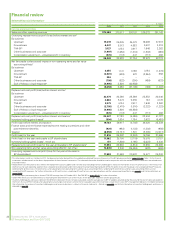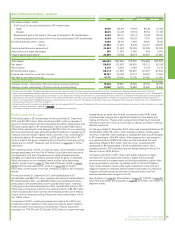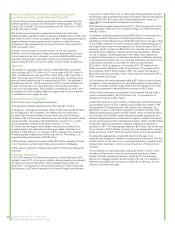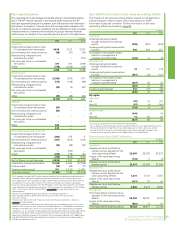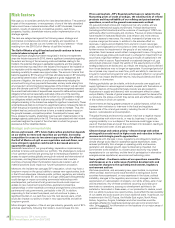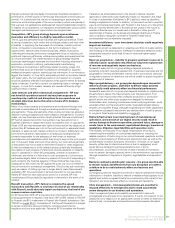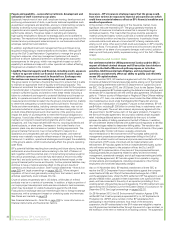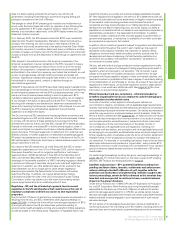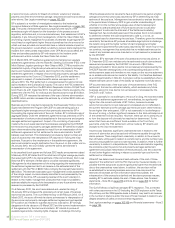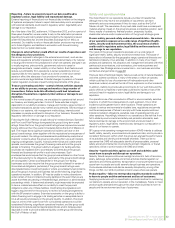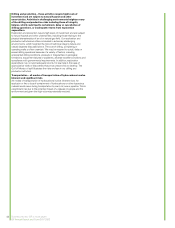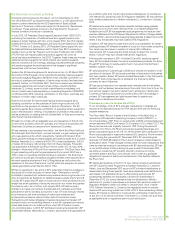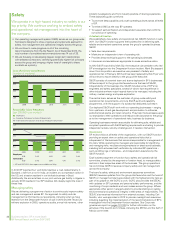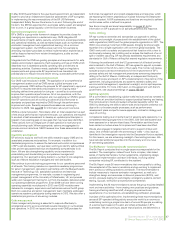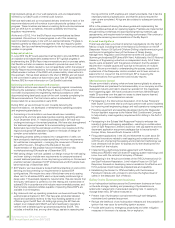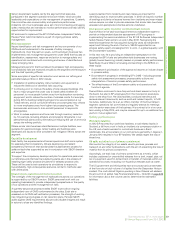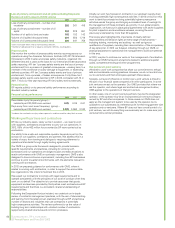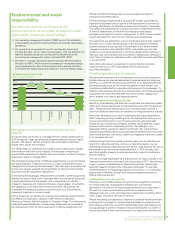BP 2012 Annual Report Download - page 43
Download and view the complete annual report
Please find page 43 of the 2012 BP annual report below. You can navigate through the pages in the report by either clicking on the pages listed below, or by using the keyword search tool below to find specific information within the annual report.
Business review: BP in more depth
Business review: BP in more depth
BP Annual Report and Form 20-F 2012
41
does not affect existing contracts the company has with the US
government, including those relating to current and ongoing drilling and
production operations in the Gulf of Mexico.
The charges to which BPXP pleaded guilty included one misdemeanour
count under the Clean Water Act which, by operation of law following the
court’s acceptance of BP’s plea, triggers a statutory debarment, also
referred to as mandatory debarment, of the BPXP facility where the Clean
Water Act violation occurred.
On 1 February 2013, the EPA issued a notice that BPXP was mandatorily
debarred at its Houston headquarters. Mandatory debarment prevents a
company from entering into new contracts or new leases with the US
government that would be performed at the facility where the Clean Water
Act violation occurred. A mandatory debarment does not affect any existing
contracts or leases a company has with the US government and will remain
in place until such time as the debarment is lifted through an agreement with
the EPA.
With respect to the entities named in the temporary suspension, the
temporary suspension may be maintained or the EPA may elect to issue a
notice of proposed discretionary debarment to some or all of the named
entities. Like suspension, a discretionary debarment would preclude BP
entities listed in the notice from receiving new federal fuel contracts, as well
as new oil and gas leases, although existing contracts and leases will
continue. Discretionary debarment typically lasts three to five years and may
be imposed for a longer period, unless it is resolved through an
administrative agreement.
While BP’s discussions with the EPA have been taking place in parallel to the
court proceedings on the criminal plea, the company’s work toward reaching
an administrative agreement with the EPA is a separate process, and it may
take some time to resolve issues relating to such an agreement. BP’s
mandatory debarment applies following sentencing and is not an indication
of any change in the status of discussions with the EPA. The process for
resolving both mandatory and discretionary debarment is essentially the
same as for resolving the temporary suspension. BP continues to work with
the EPA in preparing an administrative agreement that will resolve
suspension and debarment issues.
The DoJ criminal and SEC settlements impose significant compliance and
remedial obligations on BP and its directors, officers and employees. Failure
to comply with the terms of these settlements could result in further
enforcement action by the DoJ and the SEC, expose BP to severe penalties,
financial or otherwise, and subject BP to further private litigation, each of
which could impact our operations and have a material adverse effect on the
group’s business. Prolonged suspension or debarment from entering new
federal contracts, or further suspension or debarment proceedings against
BP and/or its subsidiaries as a result of violations of the terms of the DoJ or
SEC settlements or otherwise, could have a material adverse impact on the
group’s operations in the US.
As a result of the SEC settlement, as of the filing with the SEC of certain
registration statements on Form S-8 on 5 February 2013, and for a period of
three years thereafter, we will no longer be qualified as a ‘well known
seasoned issuer’ (WKSI) as defined in Rule 405 of the Securities Act of
1933, as amended (Securities Act), and therefore will not be able to take
advantage of the benefits available to a WKSI, including engaging in delayed
or continuous offerings of securities using an automatic shelf registration
statement. In addition, as of the settlement date and for a period of five
years thereafter, we are no longer able to utilize certain registration
exemptions provided by the Securities Act in connection with certain
securities offerings. In addition, we may be denied certain trading
authorizations under the rules of the US Commodities Futures Trading
Commission, which may prevent us in the future from entering certain
routine swap transactions for an indefinite period of time.
Regulatory – BP, and the oil industry in general, face increased
regulation in the US and elsewhere that could increase the cost of
regulatory compliance and limit our access to new exploration
properties.
Due to the Gulf of Mexico oil spill and any remedial provisions contained in or
resulting from the DoJ and SEC settlements (see Legal proceedings on
pages 162-169), it is likely that there will be more stringent regulation of BP’s
oil and gas activities in the US and elsewhere, particularly relating to
environmental, health and safety controls and oversight of drilling operations,
as well as access to new drilling areas. Regulatory or legislative action may
impact the industry as a whole and could be directed specifically towards
BP. New regulations and legislation, the terms of BP’s settlements with US
government authorities and future settlements or litigation outcomes related
to the Incident, and/or evolving practices could increase the cost of
compliance and may require changes to our drilling operations, exploration,
development and decommissioning plans, and could impact our ability to
capitalize on our assets and limit our access to new exploration properties or
operatorships, particularly in the deepwater Gulf of Mexico. In addition,
increases in taxes, royalties and other amounts payable to governments or
governmental agencies, or restrictions on availability of tax relief, could also
be imposed as a response to the Incident.
In addition, the oil industry in general is subject to regulation and intervention
by governments throughout the world in such matters as the award of
exploration and production interests, the imposition of specific drilling
obligations, environmental, health and safety controls, controls over the
development and decommissioning of a field (including restrictions on
production) and, possibly, nationalization, expropriation, cancellation or
non-renewal of contract rights.
We buy, sell and trade oil and gas products in certain regulated commodity
markets. Failure to respond to changes in trading regulations could result in
regulatory action and damage to our reputation. The oil industry is also
subject to the payment of royalties and taxation, which tend to be high
compared with those payable in respect of other commercial activities, and
operates in certain tax jurisdictions that have a degree of uncertainty relating
to the interpretation of, and changes to, tax law. As a result of new laws and
regulations or other factors, we could be required to curtail or cease certain
operations, or we could incur additional costs. See pages 51-54 for more
information on environmental regulation.
Ethical misconduct and non-compliance – ethical misconduct or
breaches of applicable laws by our employees could be damaging to
our reputation and shareholder value.
Our code of conduct, which applies to all employees, defines our
commitment to integrity, compliance with all applicable legal requirements,
diversity, high ethical standards and the behaviours and actions we expect of
our businesses and people wherever we operate. Our values are intended to
guide the way we and our employees behave and do business. Under the
terms of the DoJ settlement (see pages 40-41), an ethics monitor will review
and provide recommendations for the improvement of our code of conduct
and its implementation and enforcement. Incidents of ethical misconduct,
non-compliance with the recommendations of the ethics monitor or
non-compliance with applicable laws and regulations, including non-
compliance with anti-bribery, anti-corruption and other applicable laws could
be damaging to our reputation and shareholder value and could subject us to
further regulatory action or penalties under the terms of the DoJ settlement.
Multiple events of non-compliance could call into question the integrity of
our operations. For example, in our trading businesses, there is the risk that a
determined individual could operate as a ‘rogue trader’, acting outside BP’s
delegations, controls or code of conduct and in contravention of our values in
pursuit of personal objectives that could be to the detriment of BP and its
shareholders.
For certain legal proceedings involving the group, see Legal proceedings on
pages 162-171. For further information on the risks involved in BP’s trading
activities, see Treasury and trading activities on page 43.
Liabilities and provisions – BP’s potential liabilities resulting from
pending and future claims, lawsuits, settlements and enforcement
actions relating to the Gulf of Mexico oil spill, together with the
potential cost and burdens of implementing remedies sought in the
various proceedings, cannot be fully estimated at this time but they
have had, and are expected to continue to have, a material adverse
impact on the group’s business.
Under the Oil Pollution Act of 1990 (OPA 90), BP Exploration & Production
Inc. and BP Corporation North America are among the parties financially
responsible for the clean-up of the Gulf of Mexico oil spill and for certain
economic damages as provided for in OPA 90, as well as certain natural
resource damages associated with the spill and certain costs determined by
federal and state trustees engaged in a joint assessment of such natural
resource damages.
BP and certain of its subsidiaries have also been named as defendants in
numerous lawsuits in the US arising out of the Incident, including actions for
personal injury and wrongful death, purported class actions for commercial


